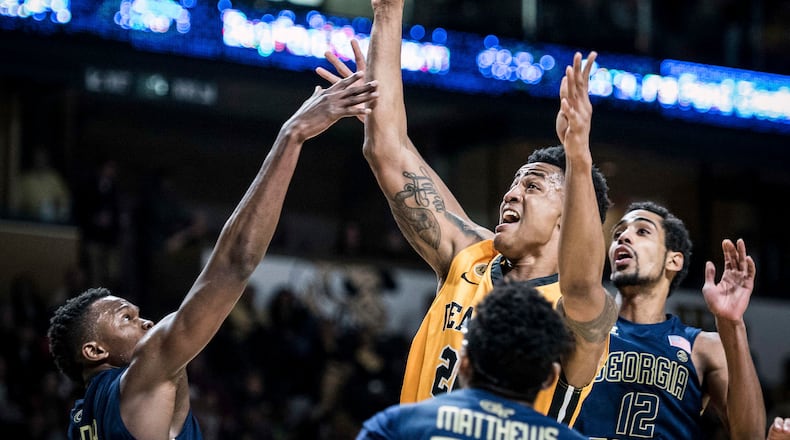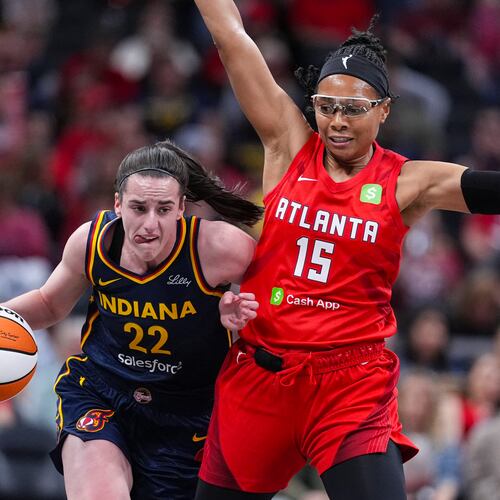Georgia Tech’s 112 seasons have seen games against Agoga Class (a tough overtime loss in Feb. 1922), Arundel Boat Club (a four-point road win in Dec. 1930) and the Mayport Naval Base (a home-and-home sweep in 1944. Incidentally, the Tech football team visited that base in Jacksonville, Fla., during its TaxSlayer Bowl trip in December.)
But the Yellow Jackets have never engaged Tusculum College on the hardwood, a void that will be filled Tuesday night at McCamish Pavilion. Tusculum, a private liberal arts college of 1,800 students in northeast Tennessee, is a Division II school.
“It’s a great opportunity,” Tusculum coach Mike Jones said Monday. “We’re really excited about playing there.”
The game came together in September as a result of coach Josh Pastner’s desire to not have an open date in the ACC schedule. In ACC play, teams typically a mid-week game and a weekend game, and the schedule for the 15-team league, released Sept. 12, left the Jackets no games between this past Saturday’s game at Wake Forest and this Saturday’s game against Boston College. ACC teams typically take the open date to rest, but Pastner’s method, going back to his time at Memphis, has been to fill in open dates with opponents.
“I do not like bye weeks,” he said. “I like staying in the rhythm and flow of two games a week.”
Normally, that might mean a game against a lower-tier Division I opponent. However, finding an opponent at that late date is a challenge, and there were advantages of a Division II opponent. One, it’s cheaper. Tusculum will receive $10,000, compared to North Carolina A&T, which was paid $85,000 and one night’s hotel accommodations to play Tech on Dec. 28. Also, Pastner wanted to limit risk. As he has said repeatedly, Pastner said he was told during the interview process by then-athletic director Mike Bobinski that the Jackets might not win an ACC game this season.
“We wanted to get a game, to play somebody – there’s no guarantee to win – but you have maybe a chance, a better chance,” Pastner said.
Tech assistant coach Eric Reveno, who is in charge of non-conference scheduling, knew Tusculum assistant coach Jay Welborn, and the game was arranged.
In an odd twist, Tech is counting the game toward its record but Tusculum is playing it as an exhibition, which NCAA rules somehow allow. By the time the game was contracted, Tusculum had already met its limit of regular-season games.
Division I and Division II teams often play in season-opening exhibitions, such as Tech’s against Shorter. But it’s not unheard of for a power-conference team to play a regular-season game against a Division II team. Georgia played Morehouse in November. Tusculum played Tennessee in Jan. 2014. The same month, Pastner and Memphis faced LeMoyne Owen. Tech last played a regular-season game against a Division II opponent in Jan. 2010 (Kentucky State, then coached by former Tech forward Clarence Moore.)
For the Division I team, it has the benefit of counting toward its record but not its RPI score, where a game against a lower-tier mid-major could hurt its RPI.
“Rather than putting a mid-major situation in the middle of your conference schedule, the mindset is to be able to put a Division II school or something like that in there and it doesn’t affect your RPI and hopefully their goal is to take care of business with the least amount of effort possible,” said Jones, the Tusculum coach.
Pastner said that stronger Division II teams are the equal of lower-tier Division I teams. He pointed out, as he is wont to do, the fact that Tech had to go to overtime to beat Shorter. Jones said that he recruits against lower-tier Division I schools.
“People don’t realize how good (high-level Division II basketball) is a lot of times,” Jones said. “Is it the same as the ACC? No, but we’ve got guys that can make baskets. We’ve got guys that can move around a little bit. We’ve got guys with some size.”
Jones said the $10,000 guarantee wasn’t incentive, but instead the opportunity to play a power-conference opponent on its home court. The game has its costs, though. The Pioneers will play a South Atlantic Conference game 24 hours after playing Tech, and it’s also on the road. Jones’ plan was to bus down to Atlanta Tuesday – a 280-mile trip – return home early Wednesday, go to class and then make the 75-mile trip to Harrogate, Tenn., to play Lincoln Memorial, which as of last week was ranked No. 21 nationally. (Tusculum is 10-12.)
With a critical league game on deck, Jones might be excused for not investing all of his team’s energies into Tuesday’s game – it is an exhibition, after all. He insists that won’t be the case. The senior-dominated Pioneers boast a guard who has made a 3-pointer in 38 consecutive games (Cory Fagan) and one of the best big men in school history (6-foot-10 Chase Mounce).
“Our players have a lot of pride, just like all other 18-to-22-year-old young men,” Jones said. “We’re going to attack this game with full force and we’ll play as hard as we can and do everything we can to have the greatest success we can.”
Tech has some players needing some time off – a bug has been circulating through the team, and guard Tadric Jackson and forward Quinton Stephens both have ankle injuries. Guard Justin Moore won’t play with an abdominal injury. Pastner said he won’t pull back either.
“This isn’t a gimme for us,” he said. “We’re going to have to play and earn the win.”
About the Author
Keep Reading
The Latest
Featured




